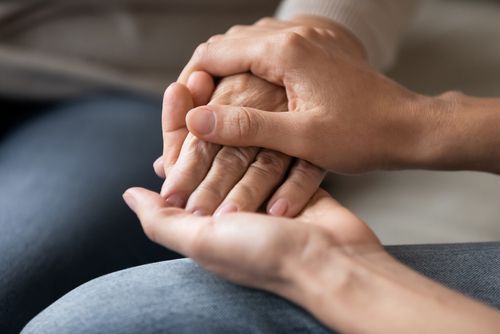 When someone close to you dies, the grief that ensues does not arrange itself in a neat, tidy process. It doesn't follow predictable patterns and may not match your expectations. You will have good days and bad days, and it's important to have the support you need during both.
When someone close to you dies, the grief that ensues does not arrange itself in a neat, tidy process. It doesn't follow predictable patterns and may not match your expectations. You will have good days and bad days, and it's important to have the support you need during both.
The difficulty may be deciding what you really need. Everyone grieves differently, so it makes sense that what works for others may not be helpful to you. Here are some tips for ensuring that you have access to the support you need.
Be Realistic About Your Needs
Conventional wisdom may tell you that it's not good for you to be alone when you're grieving. In a sense, this is true. No matter how tempting it is to do so, try not to isolate yourself. Staying connected may feel like a complicated task, but grief plays tricks on your mind. It's crucial to have others to help ground you.
Taking time away from the inherent social demands of interacting with other people is also a necessary part of the grieving process. It is a little easier to get some personal space if you live alone, but you still need to be careful not to overcommit yourself. This means setting clear boundaries with people who don't live with you so they understand that, while you appreciate their concern, you don't need constant supervision. You may even need to have those conversations with people you do live with, especially if you are an introvert.
Build a Trust Circle
There's no easy way to know for sure who is going to be able to walk through your grief with you. You just have to ask. Make a list of friends and family who are close to you, and contact them to request their support. Consider starting an email list or a group text for those who confirm they want to be on call.
It may also be helpful to have one person in particular who serves as your emergency contact. This is the person you call in the middle of the night if you need someone to talk you through a panic attack or other intense feelings. You may not ever need to do so, but knowing that he or she is ready and willing to take your call can be a comfort.
Let People Help
Many people feel alone when they're grieving. They don't want to be seen as a burden, but it is normal to need a lot of care during this time, regardless of how long the grieving process lasts. When those who are close to you find out that you're suffering, they will likely offer to help in any way they can. Take them up on their offers. Give them a list of specific tasks you may want help with:
- Meal preparation
- Housekeeping
- Laundry
- Social distraction
- Childcare
Everyone you expect to reach out may not do so. Don't spend unnecessary energy worrying about it. The grieving process is difficult, even from the outside, but you may be surprised how many people do show up to help. If you have an answer ready when they ask, you're more likely to get the support you need the most.
Schedule Regular Support
No matter how much comfort you get from friends and family, there is something special about talking through your grief with others who are either specially trained to help or going through the same thing. Find a grief counselor you can afford and set up regular appointments. It's also a good idea to find a grief support group, either online or at a location near you.
Building a grief support system that satisfies your needs takes some effort. Ultimately, however, it can help you get through hard times more smoothly.